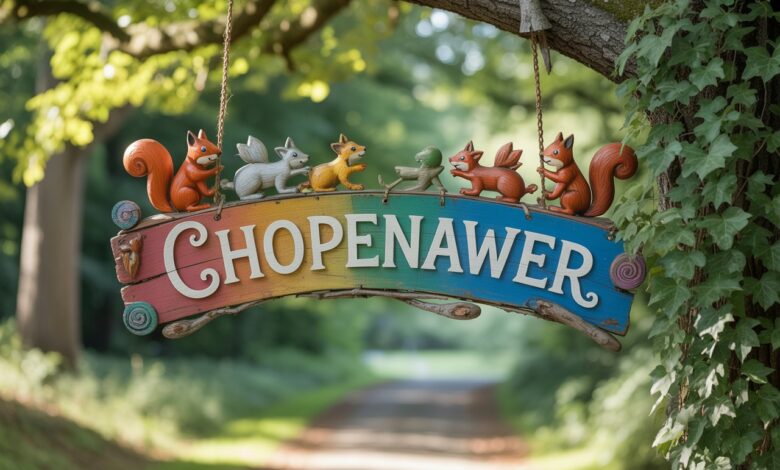Chopenawer: The Strange Word Taking Over the Internet in 2025

Have you seen the word chopenawer popping up online lately? It shows up in posts, comments, and memes. People use it in different ways. Some treat it like a joke. Others use it as a name or a handle. This piece will explain the main ideas so you can spot it and know what people mean.
In short: chopenawer is a new, odd-sounding word with no single, fixed meaning. That confusion is part of the fun. The word has become a small online mystery. Different sites and writers have looked at it from different angles. I’ll use what reporters and posts say, and I’ll keep things simple.
What “chopenawer” really is
At its most basic, chopenawer is a unique label people use online. Some call it a meme word. Others treat it as a brand name or an alias. No one has a single, agreed meaning for it yet. The word’s strange sound helps it stand out. That makes people notice and share it.
Because the word has no clear origin everyone fills the gap with their own ideas. Some writers point out a possible faint echo of the philosopher Schopenhauer in the sound, but this is only a guess. Mostly, people use chopenawer for style, not strict meaning. That mystery is part of its pull.
Where and why it spreads

You will see chopenawer across many social platforms. It shows up in short posts, captions, and meme replies. The word spread quickly because it is flexible. People can use it for a mood, a joke, or a small jab. That flexibility makes it easy to reuse.
Another reason it spreads is how social feeds work. When a new, odd word gets likes and replies, algorithms push it to more people. Soon it appears everywhere in a short time. That fast spread is exactly what happened with chopenawer—it floated across X, TikTok, Instagram, and other places.
How people use chopenawer (real examples)
Many people use chopenawer as a meme tag or a funny label. For example, you might see a caption like “That’s so chopenawer” under a chaotic photo. Or someone might drop the word in a reply to be playful. Using it can signal you’re “in” on a trend.
The word also appears as a creative name or online identity. Some creators use it as a handle or alias to build a unique persona. That use turns the word into a small brand. Sites that track online names say people pick it because it sounds memorable and mysterious.
Chopenawer and politics — a different use
Not all uses are jokes. There is a real X (Twitter) account tied to the name. The handle @dchopenawer posts short, sharp political comments in Spanish. That account mixes satire and quick takes on current events. So chopenawer is not only a meme; it can also be a voice in political chat.
That shows how the same word can live in different places at once. In one corner it’s playful internet slang. In another it’s a serious account writing about politics. The mix of uses makes the word richer — and sometimes harder to pin down.
How to use chopenawer the right way
If you want to join the trend, the first step is to understand the tone behind chopenawer. It’s playful, bold, and a little strange — and that’s the point. You can use it to sound funny, creative, or just to stand out. For example, if a friend sends a weird meme, you can reply with “That’s pure chopenawer energy.” It fits right in with today’s internet humor — short, random, and fun.
Another good use is turning chopenawer into a nickname or tag. Many online creators do this to build their own small brand. It looks modern, mysterious, and easy to remember. You could name a playlist “Chopenawer Vibes” or start a small art page with the word in it. The point is to use it in a way that matches your own style.
Avoiding common mistakes
Because the word is new and flexible, people sometimes use chopenawer in the wrong way. A common mistake is to force it into serious talk where it doesn’t fit. The word works best in casual, fun, or creative settings — not in work emails or formal writing.
Another mistake is overusing it. When you say chopenawer too many times in one post or message, it can sound odd or fake. The key is balance. Drop it once or twice to make people smile or think — and then move on. Like any good trend, it works best when it feels natural, not planned.
The meaning behind the mystery
Even though chopenawer started as a random online term, it tells us something deeper about how the internet works. People love to play with language. We create new words just because they sound fun or different. Chopenawer shows how quickly an idea can grow and spread without any big company or celebrity behind it.
It also shows how users shape meaning. There’s no fixed rule for what chopenawer means. Each person gives it their own flavor. Some make it funny, some use it for art, and others use it for social talk. That freedom is what keeps it alive.
The future of chopenawer

So, what’s next for this strange little word? Trends like this can fade, but some survive and grow into bigger movements. Chopenawer could stay as a small inside joke online, or it might evolve into something new — maybe a meme brand, a creative page, or even a music tag.
What matters is that it’s a great example of how fast digital culture moves in 2025. One day a word doesn’t exist — the next, it’s everywhere. That’s the magic of the internet: everyone can create something, share it, and watch it spread. Chopenawer proves that even one random word can become a shared language between thousands of people.
Final thoughts
In the end, chopenawer isn’t just a word. It’s a sign of how online life keeps changing. It’s fun, open, and full of surprises. Whether you use it in a caption, a comment, or as part of your username, remember to keep the same spirit — creative and light.
So, next time you see chopenawer pop up, you’ll know it’s more than just a meme. It’s a small piece of digital culture. A reminder that the internet is still a place where words, ideas, and laughter can grow fast — and connect people in the most unexpected ways.



